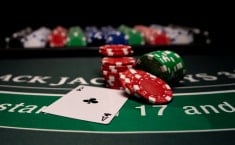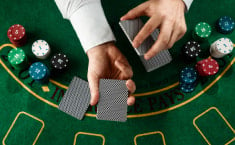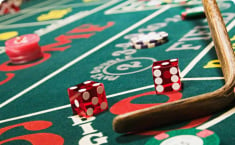Blackjack rules
Blackjack is an exciting game; while it's fairly easy to pick up and play as a beginner, it can also be incredibly complex.
Blackjack rules include the basics of the game and also betting options and strategies. We are going to do a deep dive into how to play a blackjack game on this page, but first, let's start with the basic rules of blackjack:
- Select the online blackjack variant you want to play. Hundreds of games are available at our recommended top online casinos, including live dealer tables. You can also check out our 'Free Blackjack' page, which has lots of free blackjack games on offer.
- Start the game by moving your virtual chips into the betting area and selecting the amount of chips or money you want to bet.
- The dealer will now deal two cards to you and two to themselves. In most variants, the dealer will show you one of their cards (the 'upcard'), and the other remains hidden.
- Check the value of the two cards you have and decide if you want to make any side bets, such as splitting pairs or doubling down.
- Evaluate the value of your cards and choose to 'Stand' (stick with the cards you have) or 'Hit' (receive another card from the dealer).
- Pay attention to the dealer's upcard and assess the potential of the dealer beating your hand or not.
- With all bets and decisions made, the round will play out. You will win if your hand is of higher value than the dealer without going over 21.
Blackjack card values
At its core, blackjack is a card-counting casino game where the value of each card contributes towards making a winning value that is less than or equal to 21.
Blackjack uses a standard deck of playing cards, but you'll find the way these cards are valued differs from other casino games. The main difference is that card suits are meaningless in blackjack, so forget about hearts, diamonds, spades and clubs when playing this game.
Another vital blackjack card value rule is that face cards all have a value of 10, while other cards have the value of their number. Ace cards have two values: 1 and 11. Here's a breakdown of the different card values below:
| Card | Value |
|---|---|
 Ace Ace |
1 or 11 |
 2 2 |
2 |
 3 3 |
3 |
 4 4 |
4 |
 5 5 |
5 |
 6 6 |
6 |
 7 7 |
7 |
 8 8 |
8 |
 9 9 |
9 |
 10 10 |
10 |
 Jack Jack |
10 |
 Queen Queen |
10 |
 King King |
10 |
Blackjack hands
Along with card values, it's very important that you understand blackjack hands if you're ever to have any success as a blackjack player. There are two hand types you will get through every round of blackjack: a hard hand or a soft hand.
Hard vs soft hands
In simple terms, a hard hand is any hand that doesn't have an Ace or is using the Ace card as 1. For example, a hand of 10-7 is known as a hard 17, and a hand of 6-A-10-3 is a hard 20. Alternatively, a soft hand is any hand that includes an Ace and it can be counted as 11. For example, an A-6 hand is a soft 17, or a 3-A-6 is a soft 19.

In most instances, choosing to hit on a soft hand will often convert it into a hard hand. For instance, if you have a soft 17 (A-6) and decide to hit and draw a seven, the Ace will need to become a one instead of 11 to avoid going bust (hard 13 instead of a bust 24). One of the remarkable things about a soft hand with an Ace is you can never go bust (because the Ace can convert to a one when you hit).
Blackjack bust cards & blackjack push
You can receive some cards in a hand known as 'bust cards'. These are cards where the probability of busting increases for both the player and the dealer. Five and six are the clear bust cards because building a winning hand from these values is slightly more challenging. If you see the dealer has one of these cards, taking a double down bet may be worth it.
One common question about blackjack is what happens when the player and the dealer finish with the same value. This is known as a 'push', and it results in what is essentially a tie. You receive your original stake back and move on to the next round.
Blackjack betting rules
There are various betting rules you should be aware of in blackjack. These rules are attached to certain moves a player might make once the game is in play, and are as follows:
Hit rules

If the total value of your hand is too low, you can choose the 'hit' option. This is when you draw another card from the dealer to contribute to your hand value. Choosing when to hit or stand is dependent on the dealer's upcard. For instance, if the dealer's upcard is a four, five or six, you should only hit if you have eight or less.
Stand rules

When you hold a hand that you think will beat the dealer, you can choose to stick with what you have. Opting to 'stand' means you will not receive another card in the round. For example, standing is the obvious choice if a player has a hand worth 17 or more.
Double down rules

If you have a particularly strong hand, you can select the 'double down' move. Here you will double the value of your initial stake to potentially win a bigger payout. You can only choose to double down once your cards are dealt. There are various scenarios for doubling your bet, including:
- If you hold a hand with a hard nine from two cards (without an Ace) and the dealer's (up) card is a 2, 3, 4, 5 or 6
- When you have a hard hand (no Ace) of 10 or 11 and the dealer's upcard is lower than 10 or 11, choose to hit because you cannot bust. You can decide to double down because the dealer risks going bust if they need to hit twice
- Your hand is a soft (with an Ace) of 16, 17 or 18 and the dealer's card is a 2, 3, 4, 5 or 6. In this situation, double down and hitting for another card are acceptable
Split rules

When you check the blackjack rules chart, you have probably seen the split bet option. This is a handy feature when your hand is made of two cards of the same value. When you choose to split, the dealer separates the two cards and creates two separate hands from them. Both hands will have additional cards, although you must make the same value bet on the second hand.
In theory, you can split any pair, whether it's twos or Kings. Even so, there are times when splitting is more advantageous and times when you should avoid this option. One obvious time to ignore the split feature is when you have two cards with a value of 10. This means you have 20, which is an excellent and probable winning hand. The general rule of them when it comes to splitting is as follows:
- Always split Aces – You have a strong chance of making 21 on both hands
- Always split eights – You can build good hands from eights
- Split sevens when the dealer shows a a card between two and seven
- Split sixes if the dealer has a card between two and six
Surrender rules

Surrender is a popular bet available in blackjack rules, allowing you to fold a hand that you don't like. When you choose to surrender, you lose half your initial stake. Still, that is better than losing everything from a terrible hand. Choose to surrender if you think your hand is beyond improvement or the dealer potentially has a better hand.
There are two surrender options in blackjack: early and late. Both work on the same basic concept, but early surrender is popular because you can fold before the dealer sees their cards. However, late surrender is a more common feature in blackjack games online and in land-based casinos.
Even money rules
One of the lesser-known rules of blackjack is the even-money bet. One of the reasons for its obscurity is that it is not widely available for online blackjack variants. With this option, the dealer will ask if you want to take 'even money' when their upcard is an Ace. So, if you wager C$20 and the dealer offers even money on an Ace, you will win C$20 back if they get blackjack (Ace and 10 value card).
Blackjack side bets
While side bets are not essential to learning how to win at blackjack, they are still worth understanding. These are additional bets/features game providers and casinos use to entice casual players and recoup more profits. Side bets are attention-grabbing options that increase the house edge and add new elements to blackjack.
Generally, you should avoid bet options such as Royal Match, Super Sevens or Over/Under 13. Simply put, these bets decrease your chances of winning and are not traditional blackjack. Only take side bets if you're playing blackjack for fun.
Blackjack dealer rules
You can never properly learn how to play blackjack without understanding blackjack dealer rules. Knowing the limitations and benefits the dealer has will allow you to make better betting decisions. Who knows, perhaps you will be hosting a blackjack evening and need to know how to deal blackjack hands.
Below are some of the essential dealer rules you must know:
- The dealer has no options for playing
- If the dealer has a hand of under 17, they must draw
- When the dealer's hand is between 17 and 21, the dealer must stand
- Some blackjack variants require the dealer to stand on a soft 17 (better for the player)
- Others may demand the dealer hits on a soft 17
How to deal in blackjack
Playing blackjack online will give you the best possible gameplay experience. The following list provides straightforward information on how the dealer process works at an online casino:
- Choose one of the reputable online casinos we have recommended, each with the best virtual and live casino blackjack games.
- Register with the online casino by providing your personal information. Deposit into your casino account using your preferred payment method and claim the available welcome bonus.
- Navigate to the casino's game lobby. You can find blackjack under the 'Table Games' section, where there should be several different variants on offer. If the casino has a live dealer section, you can choose to play with human dealers via video stream.
- When you choose the blackjack game you want to play, place your bets on the game table.
- The dealer will now deal two cards to you, which is your hand for the round. Depending on the variant, the dealer will also show their upcard.
- Based on the potential of your hand, choose whether you want to stand, hit or make a bet such as split or double down.
- Once all players have made their betting moves, the dealer will reveal their hand. This is either both cards or face down cards, depending on the blackjack rules in the variant you're playing.
- You can now compare your hand with the dealer's, and depending on the outcome, you will know if you have won or not.
Blackjack variant rules
One of the most confusing aspects of blackjack for beginners is that there are so many variants of the game. Single-deck, multi-deck, available bet options and other rules will differ from game to game. To make it easier for you to understand the blackjack variants at online casinos, we have put together the following blackjack rules chart:
| Rules | American Blackjack | European Blackjack | Vegas Strip Blackjack | Vegas Downtown Blackjack |
|---|---|---|---|---|
| No. of decks | 6 | 2 | 4 to 8 | 2 |
| Dealer stands | 17+ | Soft 17 | Soft 17 | 17+ |
| House edge | 0.31 – 0.35% | 0.40% | 0.35% | 0.39% |
| Blackjack payout | 3 to 2 | 3 to 2 | 3 to 2 | 3 to 2 |
| Hole card game? | Yes | No | Yes | Yes |
| Later surrender? | Yes | No | No | |
| Double down? | Yes | 10 value cards and Aces | Yes | Yes |
| Double down on splits? | Yes | No | Yes | Yes |
Top tips for playing blackjack at a casino
You now have a solid knowledge of blackjack rules and understanding how to play blackjack. The next step is to put the information in this guide into action.
But before you head off, one of our top blackjack tips involves understanding the differences between playing blackjack online and at a brick-and-mortar casino.
While the rules of blackjack remain the same when playing at a land-based casino, what you will need to understand is hand signals. These are simple gestures you make to the dealer to point out what choices you want to make with your hand:
- Hit – When you want to draw another card, tap your index finger on the table
- Stand – Subtly wave your hand above the cards to tell the dealer you will stick with your hand
- Double down – Move more chips equal to the initial stake, but leave them outside the box. Point to the additional stake to signal a double down
- Split – Do the same as with a double down by placing chips outside the box. This time, point with two fingers in a V-shape to split the hand
- Surrender – No universal gesture exists for surrendering, so you can simply communicate this option by speaking
Blackjack etiquette
Like any game, the rules of blackjack are accompanied by various procedures and do's and don'ts. Understanding the code of conduct will help create the best experience for you, fellow players and the dealer. Blackjack etiquette is easier online than in a land-based casino, although many aspects cross over between the two.
When online, always stick to the blackjack rules and remain respectful. As for visiting a casino to play blackjack, the following etiquette will make you the model customer:
Always place bets on the table outside your betting box.
And never under any circumstances take the cards below the table where the dealer and the security team can't see them.
Touching cards slows down the game and could lead to accusations of cheating.
Drinks are usually accepted in holders provided by the casino.
You shouldn't be touching your chips once your cards are dealt and your bet is made.
Always use hand signals for security reasons!
Don't get angry at losses, don't mock other players and remain polite to dealers at all times.
Even if you consider yourseld to be the next blackjack king, let others use their chips how they want!
More on blackjack
FAQs
Blackjack is a card game where the player competes against the dealer to see who has the best value hand. The goal is to get as close to, or on, 21 without going over (known as 'bust'). Players receive two cards to start and can choose to stick with their initial hand or receive more cards.






